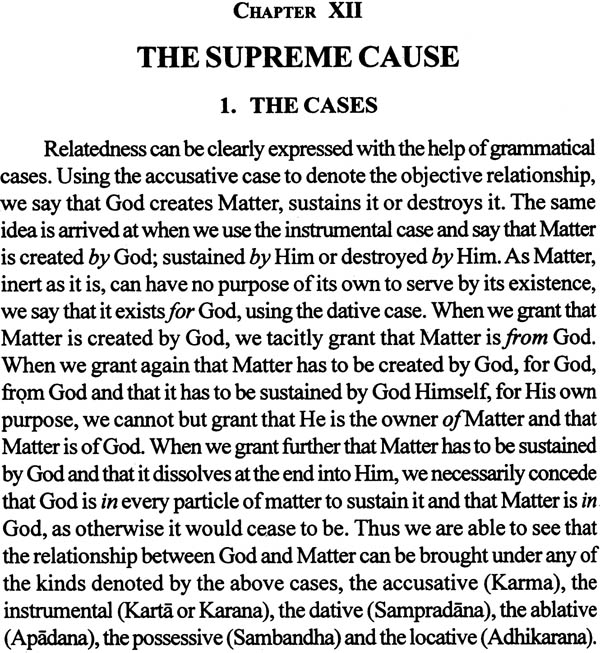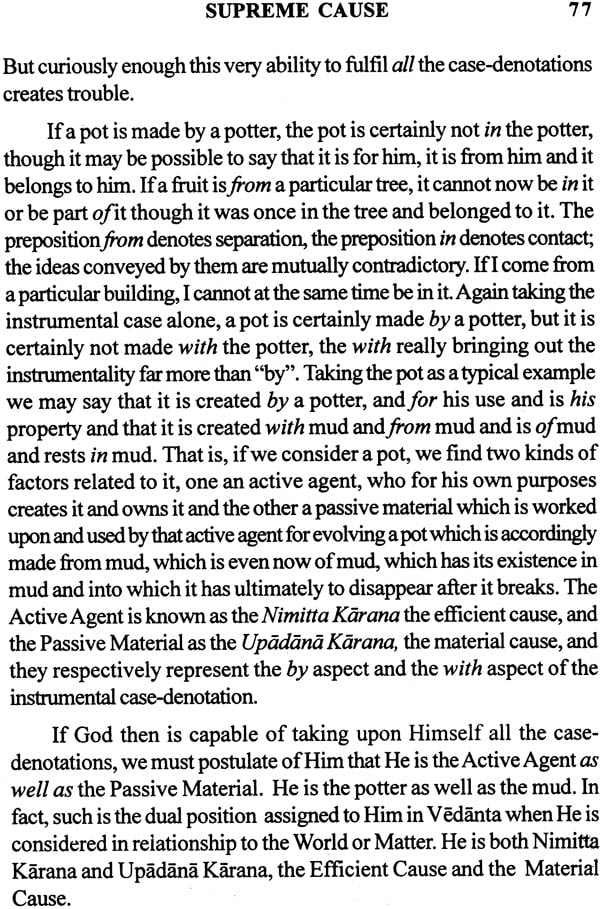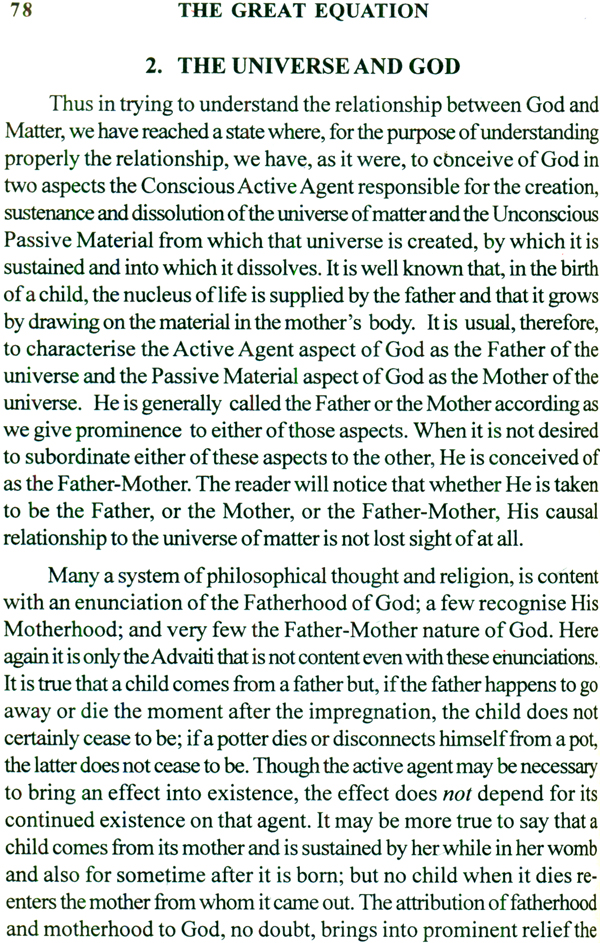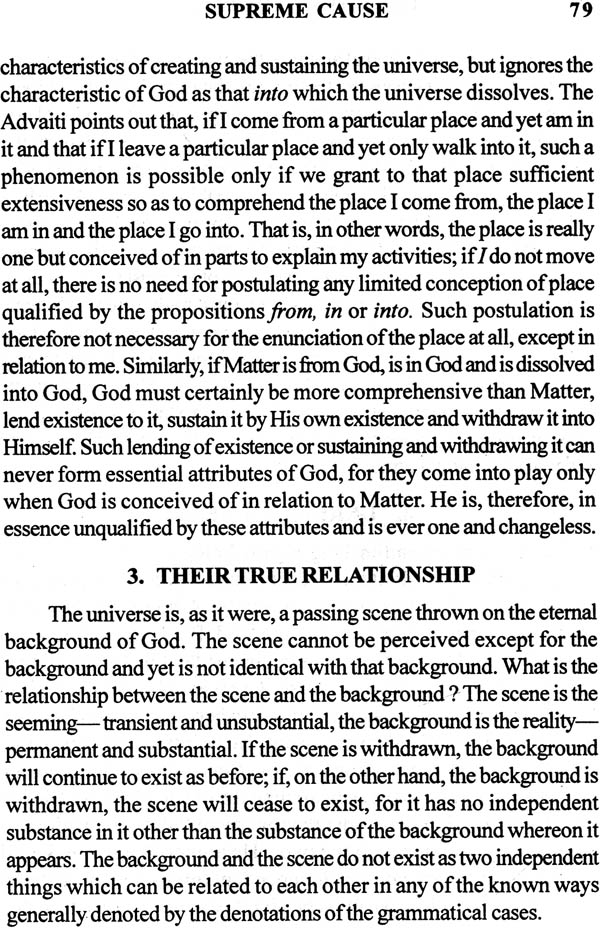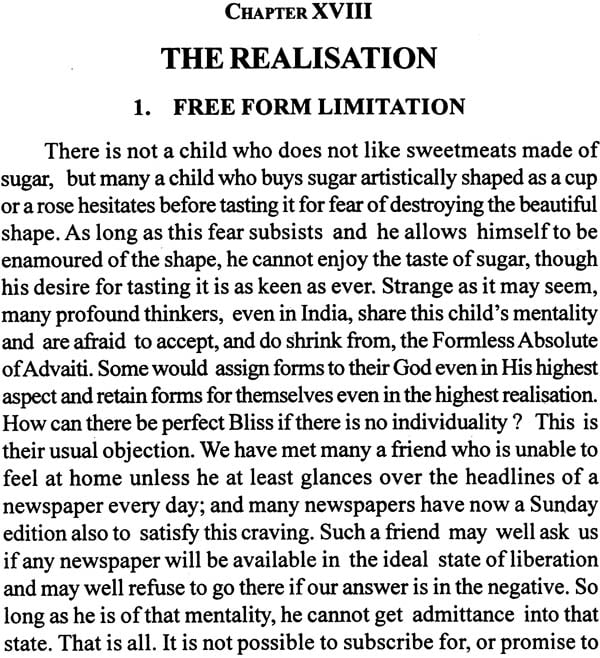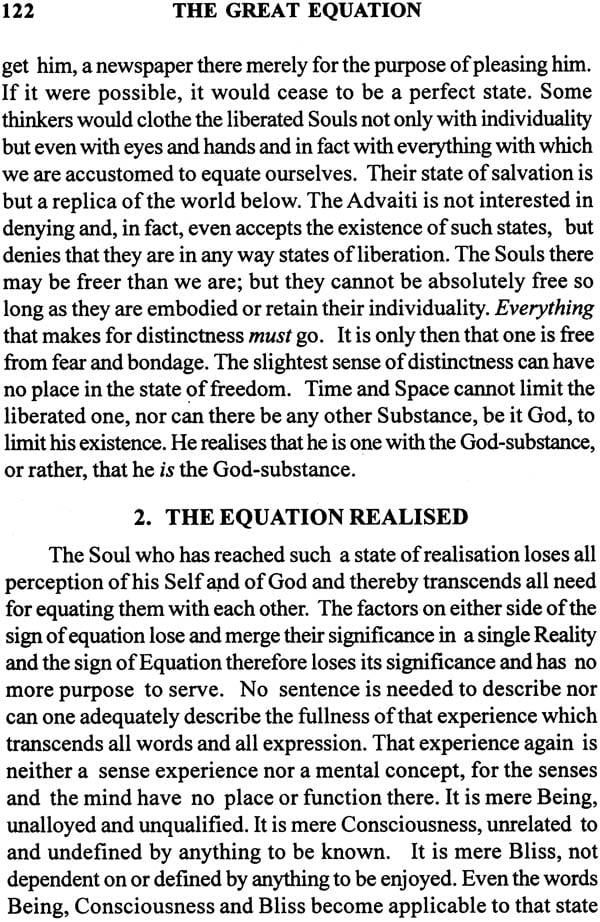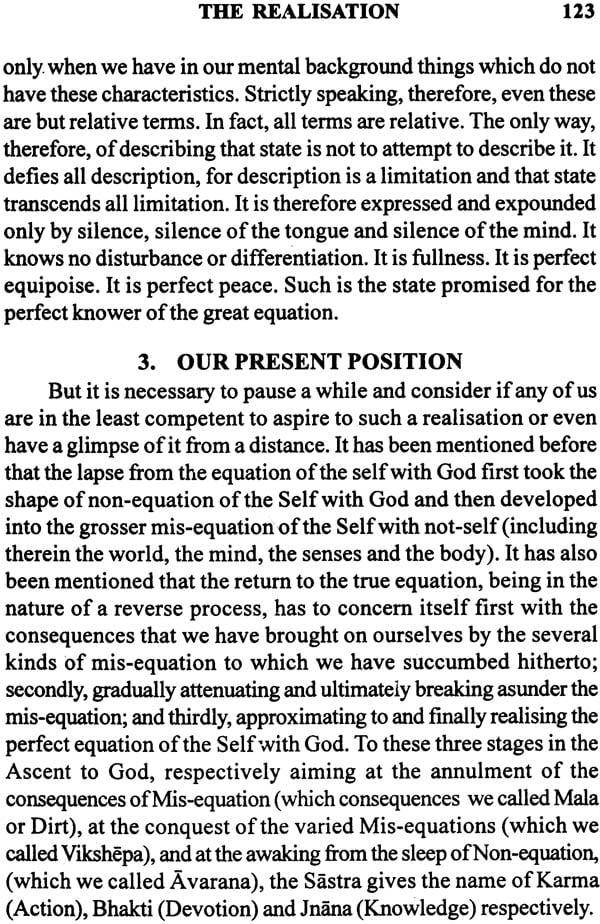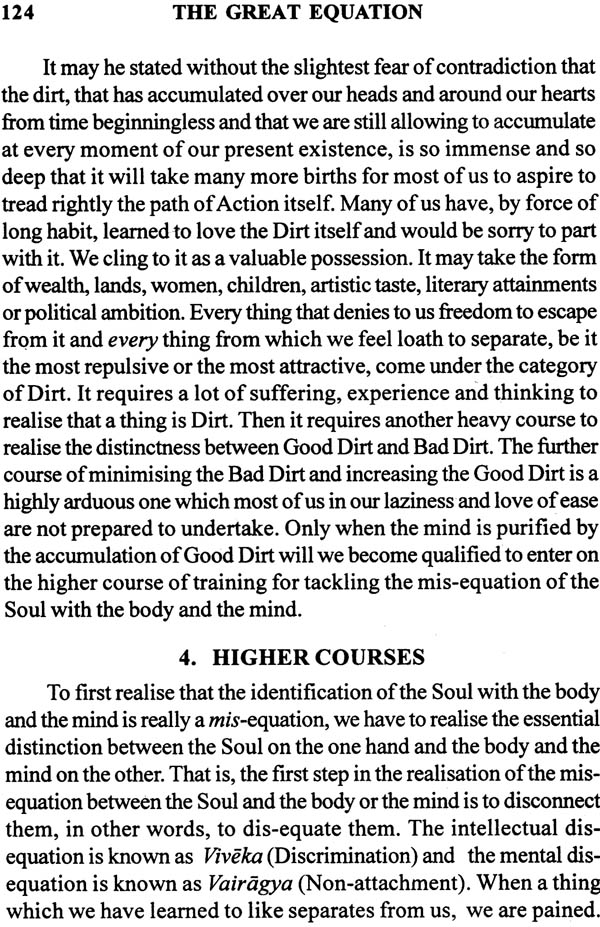
The Great Equation: Doctrine of Advaita Vedanta
Book Specification
| Item Code: | NAJ960 |
| Author: | Sri Jnanananda Bharathi |
| Publisher: | Sri Gnanananda Bharathi Grantha Prakasana Samithi |
| Language: | English |
| Edition: | 2015 |
| Pages: | 156 (4 B/W Images) |
| Cover: | Paperback |
| Other Details | 8.5 inch x 5.5 inch |
| Weight | 180 gm |
Book Description
This is a logical presentation of the doctrine of Advaita Vedanta. The language used is simple and lucid and the explanations with th``127e help of common day to day illustrations make the book very interesting and informative even to a casual reader. The author has successfully used even mathematical equations to prove the central theme of Adviata Vedanta that the "Jeevatma"(the Seeker) and the "Paramatma" (the Sought) are one and the same all the time and that truth is only required to be known and understood. This is a valuable book for one and all.
This new edition of one of the most famous books of the author, 'The Great Equation', is being brought by Sri Jnanananda Bharathi Grantha Prakasana Samithi, will be welcomed by one and all, who would like to know in clear terms what exactly the philosophy of advaitais.
The learned author, Sri Jnanananda Bharathi Swamigal was well known in his poorvashrama as Sri R. Krishnaswami Aiyar, Advocate, Tirunelveli (Tamilnadu).
Having been born as the eldest son of the great Sri G. Ramachandra Aiyar, Advocate, Tiunelveli(who was known later as Sri Ramananada Saraswathi Swamigal after he took sannyasa), Sri R.Krishnaswami Aiyar nurtured his inborn desire to study Indian Philosophy and mastered it at a very young age. He had a flair for explaining it to others through lectures and in writing in a very lucid manner, in Tamil, Sanskrit and English. He led a very simple sastraic life throughout and spent his last years as a paramahamsa sannyasi in the village of Mannadimangalam near Madurai till he passed away in the year 1975.
His translation in Tamil of the Sankara Bhashyam on Brahmasutras, and commentaries on some of the prakasana granthas of Sri Sankara Bhagavatpada are voluminous and all of them have come out in print.
Among the books written by him in English are, An Introduction to Vedanta, Outlines of Vedanta, Thoughts from the Gita, The Great Equation, Dialogues with the Guru and The Call of the Jagadguru. All of them have gone through many editions because of the richness of their contents, the simple and lucid style of writing and above all the authenticity.
This edition has been blessed by His Holiness Sri Bharathi Theertha Mahaswamigal,Peetadhipathi of Dakshinamnaya Sri Sharada Peetam of Sringeri.
| Preface to Third Edition | v | |
| Preface to First Edition (Extract) | ix | |
| I | AN AXIOM | 1 |
| 1. The State of Freedom | ||
| 2. Its Nature | ||
| 3. Some Questions | ||
| 4. The Basic Mistake | ||
| 5. The Bold Advaiti | ||
| II | THE SUPREME BEING | 8 |
| 1. Nature of Being | ||
| 2. Time and Space | ||
| 3. The All | ||
| 4. Absolute Greatness | ||
| 5. ANote of Warning | ||
| III | THE LURE OF THE ABNORMAL | 14 |
| 1. The Background | ||
| 2. The Uninteresting Normal | ||
| 3. The Great Normal | ||
| 4. The Form Side | ||
| 5. True Perception | ||
| IV | THE LADDER OF REALISATION | 21 |
| 1. The Descent | ||
| 2. The Ascent | ||
| 3. A Common Mistake | ||
| 4. Truth and Falsehood | ||
| 5. The Mis-equation | ||
| V | PROPER GUIDANCE | 28 |
| 1. Substance and Form | ||
| 2. Virtue and Vice | ||
| 3. Proper Guides | ||
| 4. A Futile Revolt | ||
| 5. The Immutable Law | ||
| VI | DESIRE AND ACTION | 35 |
| 1. Twofold Action | ||
| 2. Purification of the Mind | ||
| 3. Refining of Desire | ||
| 4. A Parallel Process | ||
| 5. Dharma Supreme | ||
| VII | REGULATION OF DUTIES | 42 |
| 1. Need for Enquiry | ||
| 2. The Ubiquitous 'I' | ||
| 3. The Subsidiary Equations | ||
| 4. Function of the Sastras | ||
| 5. Law, Ordinary and Special | ||
| VIII | THE THREE BODIES | 49 |
| 1. The Coverings | ||
| 2. Mis-Equation with These | ||
| 3. The Growth of the Bodies | ||
| 4. A Curious Trait | ||
| IX | DEDICATION OF THE BODIES | 56 |
| 1. Wanted a Donee | ||
| 2. The Supreme Donee | ||
| 3. The Embodied God | ||
| 4. Attitude of the Devotee | ||
| X | THE BODIES AND THE WORLD | 62 |
| 1. A Different Dedication | ||
| 2. The Five Elements | ||
| 3. The Subtle Elements | ||
| 4. The Control of the Bodies | ||
| XI | DEPENDENT EXISTENCE | 69 |
| 1. The Ultimate Cause | ||
| 2. The Name Advaita | ||
| 3. An Analysis | ||
| 4. Matter and God | ||
| XII | THE SUPREME CAUSE | 76 |
| 1. The Cases | ||
| 2. The Universe and God | ||
| 3. Their True Relationship | ||
| 4. Unrelatedness | ||
| XIII | THE TRUE EQUATION | 83 |
| 1. Apposition | ||
| 2. Perfect Identity | ||
| 3. Evaluation | ||
| 4. Equation | ||
| 5. The Teaching of the Veda | ||
| XIV | KINDS OF EQUATION | 88 |
| 1. Synonym | ||
| 2.Adjective | ||
| 3. Imposition | ||
| 4. The Vanishing Equation | ||
| X.V | THE VEDIC EQUATION | 99 |
| 1. Its nature | ||
| 2. Supposition | ||
| 3. Function of Attributes | ||
| 4. Mutual Qualification | ||
| XVI | KINDS OF SIGNIFICANCE | 107 |
| 1. The Literal | ||
| 2. The Derivative | ||
| 3. Different Standpoints | ||
| XVII | THE CONQUEST OF MAYA | 112 |
| 1. Truth Absolute and Relative | ||
| 2. Mistakes Infinite | ||
| 3. Transcendence | ||
| 4. Nature of Power | ||
| 5. The Escape | ||
| XVIII | THE REALISATION | 121 |
| 1. Free from Limitation | ||
| 2. The Equation Realised | ||
| 3. Our Present Position | ||
| 4. Higher Courses | ||
| 5. The Way of Knowledge | ||
| 6. Further Steps | ||
| 7. Conclusion | ||
| GLOSSARY OF SANSKRIT WORDS | 130 |
